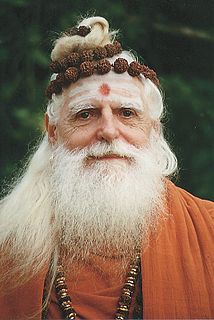A Quote by Deepak Chopra
Every action generates a force of energy that returns to us in like kind... what we sow is what we reap. And when we choose actions that bring happiness and success to others, the fruit of our karma is happiness and success.
Related Quotes
Karma is not fate, for man acts with free will, creating his own destiny. The Vedas tell us, if we sow goodness, we will reap goodness; if we sow evil, we will reap evil. Karma refers to the totality of our actions and their concomitant reactions in this and previous lives, all of which determines our future.
In our concern for others, we worry less about ourselves. When we worry less about ourselves an experience of our own suffering is less intense. What does this tell us? Firstly, because our every action has a universal dimension, a potential impact on others' happiness, ethics are necessary as a means to ensure that we do not harm others. Secondly, it tells us that genuine happiness consists in those spiritual qualities of love, compassion, patience, tolerance and forgiveness and so on. For it is these which provide both for our happiness and others' happiness.
What brings the karmic result from the patterns of our actions is not our action alone. As we intend and then act, we create [our] karma: so another key to understanding the creation of karma is becoming aware of intention. The heart is our garden, and along with each action there is an intention that is planted like a seed. The result of the patterns of our karma is the fruit of these seeds.
Karma is the universal law of cause and effect. You reap what you sow. You get what you earn... If you give love, you get love. Revenge returns itself upon the avenger. What goes around comes around... Karma is justice. It does not reward or punish. It shows no favoritism because we have to earn all that we receive. Karma doesn't predestine anyone or anything. We create our own causes, and karma adjusts the effects with perfect balance.
You make the mistake of thinking you have to choose, that you have to do what you want, that there are conditions for happiness. What matters — all that matters, really is the will to happiness, a kind of enormous, ever present consciousness. The rest - women , art, success — is nothing but excuses. A canvas waiting for our embroideries.
One Dilbert Blog reader noted that current research shows that happiness causes success more than success causes happiness. That makes sense to me. There's plenty of research about people having a baseline of happiness that doesn't vary much with circumstances. And given that happy people are typically optimistic, energetic, and fun to work with, I can see how happiness would lead to success.

































